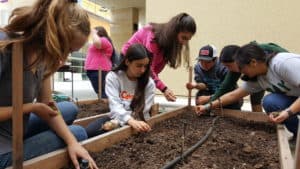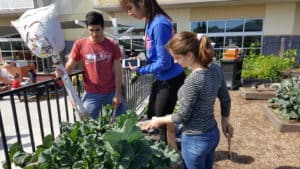by Tzachi Flatt, Oshman JCC, Palo Alto, CA
Parashat Pikudei tells the story of the construction of the Mishkan, built by the Israelite community under supervision of the Levites. While wandering in the desert, it became a source of comfort and communication for the people of Israel to create a central meeting place where they could connect to G-d. This was constructed to be their divine headquarters. Externally, they were surrounded by the wide expanse of the desert. Internally, they did not know where they were going. G-d saw them in this state, and commanded them to create this space for their own well-being. Parashat Pikudei goes into exhaustive detail about all the pieces of the Mishkan, such a significant undertaking can only be accomplished with the entire community working together cohesively.
In thinking about the underlying message of this parasha, at least two key points rose to the surface. Everyone’s contribution to the common goal is not only expected, but is essential to its success. “Do not separate yourself from the community” – Pirkei Avot. We each carry a unique skill set that adds its own value and meaning to the greater good. When we work together towards a common goal we have an invested interest in holding each other accountable for our actions, as well as offering support when we are in need. Because when an individual in the community is in need, it is in fact the whole community that is in need. The natural world is a sacred space that requires our careful attention. We are commanded to be shomrei adamah – keepers of the earth (Genesis). Every one of us can contribute to sustainability or work against it. The daily decisions we make and the routines that we become accustomed to in our daily lives have a much larger effect on the world than appears to us on the surface. It is therefore also important to continually asses and reassess our choices to see that we are contributing positively in whatever we decide to pursue.

The Mishkan that was built required not only careful construction, but continuous sustaining as well. It can be interpreted as a metaphor for the universe, every aspect of it needed to be beatified as well as balanced. The natural world shares many similarities in this regard, created by the divine, and left to us to be the caretakers. An important question arises from this interpretation: how do we behave in the world so that we honor the space and maintain it – individually and as a whole? When we all share a common understanding that we are collectively responsible for this overwhelming task, we will not only work diligently, but also prop each other up so that everyone is successful in their part, and sees their value in this vast expanse. There is a saying that you are only as strong as your weakest link. In order to keep our metaphorical chain (the natural world) healthy and strong, we must continuously practice conscious assessment and revaluation of ourselves and others, working together to keep all the pieces intact, efficient, and deeply understanding their greater value.

Tzachi Flat was born and raised in Palo Alto, California. As a child he spent many summers traveling to Israel. In 2006 he lived and worked at a scuba diving shop in Eilat. These experiences created a very strong connection to Israel for him. In his free time Tzachi love to play sports, hang out with friends, travel, build things, and do anything and everything active and outdoors. He has been involved with the JCC since he was 2 years old, and has worked for the Oshman Famil JCC in Palo Alto’s Youth And Teen department for the last 4 years. The experience he gained working at the JCC have helped him become a stronger, more confident person. He is very excited for the opportunity to meet new people, share memorable experiences, learn new things, and help educate others through the JOFEE fellowship.
Editor’s Note: Welcome to D’varim HaMakom: The JOFEE Fellows Blog! Most weeks throughout the year, you’ll be hearing from the JOFEE Fellows: reflections on their experiences, successful programs they’ve planned and implemented, gleanings from the field, and connections to the weekly Torah portion and what they’ve learned from their experiences with place in their host communities for the year. Views expressed are the author’s and do not necessarily represent Hazon. Be sure to check back weekly!




Comments are closed.